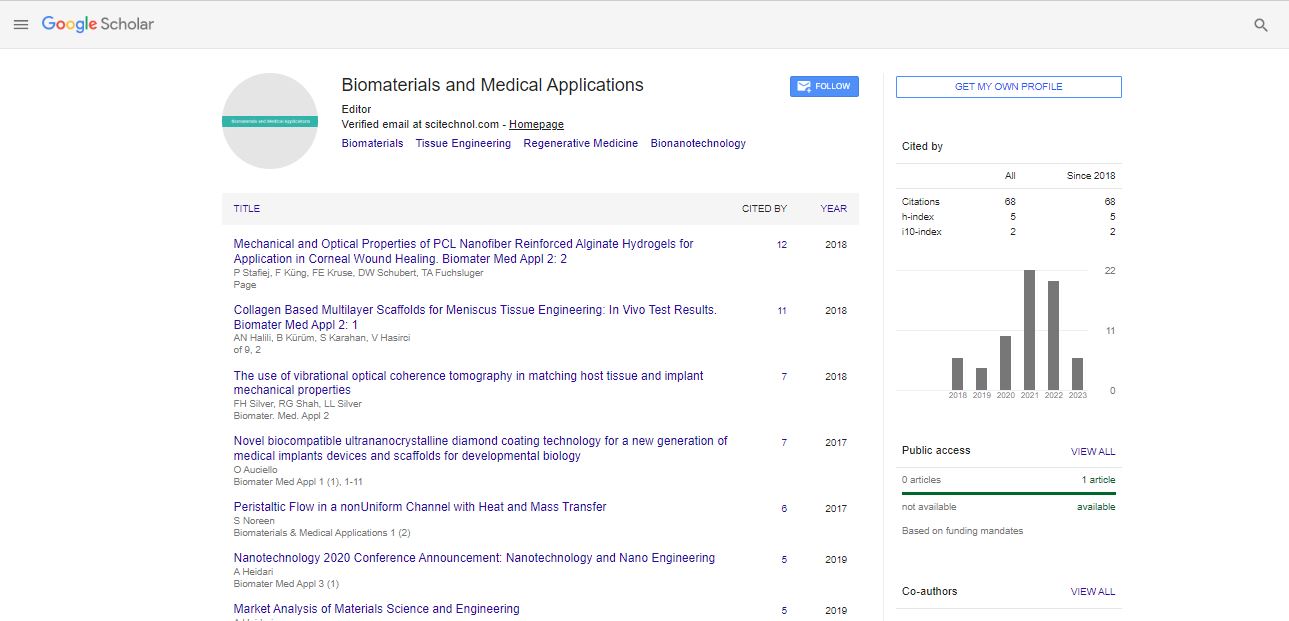Perspective, Biomater Med App Vol: 7 Issue: 3
Global Investigation Collaboration in Regenerative Medicine: Achievements and Prospects
Sofia Petrov*
Department of Biomedical Chemistry, University of Gdansk, Gdansk , Poland
*Corresponding Author: Sofia Petrov,
Department of Biomedical Chemistry,
University of Gdansk, Gdansk , Poland
E-mail: sofia.petrov@123gmail.com
Received date: 28 August, 2023, Manuscript No. BMA-23-116232;
Editor assigned date: 30 August, 2023, PreQC No. BMA-23-116232 (PQ);
Reviewed date: 13 September, 2023, QC No. BMA-23-116232;
Revised date: 21 September, 2023, Manuscript No. BMA-23-116232 (R);
Published date: 29 September, 2023, DOI: 10.35248/2577-0268.100536
Citation: Petrov S (2023) Global Investigation Collaboration in Regenerative Medicine: Achievements and Prospects. Biomater Med App 7:3.
Description
The field of regenerative medicine has witnessed remarkable advancements in recent years, thanks in no small part to global investigation collaboration. Clinicians from around the world have come together to pool their expertise and resources, accelerating progress in this transformative discipline.
The collaborative cornerstones of regenerative medicine
The power of collaboration: Regenerative medicine, with its goal of repairing, replacing, or regenerating tissues and organs, represents a paradigm shift in healthcare. Achieving breakthroughs in this field requires interdisciplinary collaboration, the sharing of knowledge, and the pooling of resources. International cooperation has proven invaluable in driving regenerative medicine forward.
Sharing of expertise: Collaborative efforts have allowed investigators to combine their expertise in diverse areas such as stem cell biology, tissue engineering, genetics, and clinical medicine. By working together, they have tackled complex challenges that no single institution or individual could address alone.
Access to resources: Global collaboration has provided access to a wider range of resources, including funding, state-of-the-art equipment, and patient samples. This has enabled investigators to conduct more extensive experiments and clinical trials, ultimately expediting the development of regenerative therapies.
Cultural and ethical perspectives: Working across borders also brings together diverse cultural and ethical perspectives. This rich tapestry of viewpoints fosters a more holistic approach to addressing the ethical and societal implications of regenerative medicine.
Organoids and 3D bioprinting: Investigators from various countries have worked together to advance the development of organoids and 3D bioprinting. Organoids, miniature organ-like structures grown in the lab, offer a platform for studying disease mechanisms and drug testing. 3D bioprinting allows for the design of complex tissue constructs, including artificial organs, by layering biomaterials and cells. These technologies open up new possibilities for transplantation and disease modeling.
Clinical trials and therapies: Global investigation collaboration has paved the way for numerous clinical trials and regenerative therapies. These include treatments for conditions like macular degeneration, spinal cord injuries, and diabetes. International cooperation has accelerated the translation of laboratory discoveries into tangible benefits for patients.
Bioethics and regulatory frameworks: As regenerative medicine advances, ethical considerations and regulatory frameworks become increasingly important. Global collaboration has led to the development of ethical guidelines and regulatory standards that ensure the safe and responsible development of regenerative therapies.
Prospects for the future
The future of global investigation collaboration in regenerative medicine is filled with exciting prospects:
Advanced therapies for incurable diseases: Investigators envision the development of advanced therapies for currently incurable diseases, including neurodegenerative disorders, heart disease, and certain types of cancer. International collaboration will be essential in overcoming the multifaceted challenges these conditions present.
Personalized medicine: Regenerative medicine holds the promise of personalized treatments tailored to an individual's genetic makeup and unique medical history. Global investigation collaboration will play a pivotal role in realizing this vision, as it requires the integration of vast genomic and clinical data from diverse populations.
Tissue engineering breakthroughs: Advancements in tissue engineering, particularly the design of functional, vascularized organs, are on the horizon. Collaborative efforts will be vital in perfecting these techniques and making them widely accessible.
Education and training: International collaboration extends to education and training programs, where experts from various countries share their knowledge and mentor the next generation of regenerative medicine. This exchange of expertise contributes to a global pool of skilled investigators.
Conclusion
Global investigation collaboration has been instrumental in advancing regenerative medicine, bringing us closer to the realization of its transformative potential. As investigators continue to work together across borders, the achievements and prospects in this field are indeed cause for optimism.
In the coming years, regenerative medicine has the potential to revolutionize healthcare, offering hope to patients facing previously incurable conditions. It is a testament to the power of international collaboration, where the shared goal of improving human health transcends geographical boundaries and leads to groundbreaking discoveries that benefit us all. The achievements to date are impressive, and the future of regenerative medicine holds even greater promise.
 Spanish
Spanish  Chinese
Chinese  Russian
Russian  German
German  French
French  Japanese
Japanese  Portuguese
Portuguese  Hindi
Hindi 